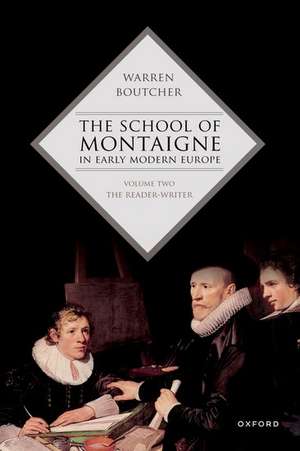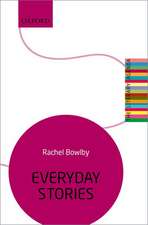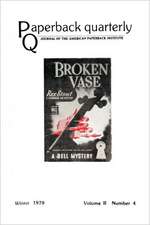The School of Montaigne in Early Modern Europe: Volume Two: The Reader-Writer
Autor Warren Boutcheren Limba Engleză Paperback – 8 sep 2022
| Toate formatele și edițiile | Preț | Express |
|---|---|---|
| Paperback (2) | 202.40 lei 10-16 zile | |
| OUP OXFORD – 8 sep 2022 | 202.40 lei 10-16 zile | |
| OUP OXFORD – 8 sep 2022 | 205.26 lei 10-16 zile | |
| Hardback (2) | 749.68 lei 31-37 zile | |
| OUP OXFORD – 30 mar 2017 | 749.68 lei 31-37 zile | |
| OUP OXFORD – 30 mar 2017 | 781.76 lei 31-37 zile |
Preț: 205.26 lei
Preț vechi: 229.44 lei
-11% Nou
Puncte Express: 308
Preț estimativ în valută:
39.28€ • 40.86$ • 32.43£
39.28€ • 40.86$ • 32.43£
Carte disponibilă
Livrare economică 13-19 martie
Preluare comenzi: 021 569.72.76
Specificații
ISBN-13: 9780192867155
ISBN-10: 0192867156
Pagini: 576
Ilustrații: Numerous black-and-white halftones
Dimensiuni: 156 x 234 x 29 mm
Greutate: 0.89 kg
Editura: OUP OXFORD
Colecția OUP Oxford
Locul publicării:Oxford, United Kingdom
ISBN-10: 0192867156
Pagini: 576
Ilustrații: Numerous black-and-white halftones
Dimensiuni: 156 x 234 x 29 mm
Greutate: 0.89 kg
Editura: OUP OXFORD
Colecția OUP Oxford
Locul publicării:Oxford, United Kingdom
Recenzii
[Boutcher] gives us an in-depth account of Montaigne's literary influence across the Western world from the sixteenth century to the present day.
Boutcher follows Montaigne and his Essais around Europe, and constructs as he goes an intricate, learned, and very readable reassessment of early modern authorship which scrupulously locates Montaigne's practice within a mobile portrait of contemporary norms...the work offers much of interest to scholars of Elizabethan literature and culture, not least as a case study in itself of an alternative mode of literary history.
[B]eneath the vast scope of Boutcher's study of the European fortunes of the Essais—in their own time, in the long seventeenth century, and in the modern Western university—lies the nagging question: but why has this book been ever arresting, and in what changing ways? If the answer has been, for many readers, "because Montaigne teaches me to think for myself," Boutcher's achievement is to show that this deceptively simple answer is variously predicated on historical conditions, hierarchies, constraints, exclusions, and technologies. ... Boutcher [turns] the long-cherished ideal of a one-to-one encounter with Montaigne from an unquestioned method of study into part of what studying and questioning the Essais should be about
Warren Boutcher ... [has] transformed the study of Montaigne's Essais ... Boutcher's ... exhaustive study of Montaigne's influence traces the actual history of his book: how it was read in numerous editions and translations across early modern Europe and how these editions inspired a new kind of reader-writer in the post-Reformation world ... Boutcher seeks to restore the Essais to its early modern milieu, to a time before it was "great."
Warren Boutcher's masterful study of the genesis and reception of the Essays within a European social network concerned with the training of liberal minds.'; 'Original wide-ranging study of Montaigne's place at the center of a European intellectual network focused on the education and training of the nobility; opens new modes of inquiry within literary/cultural interrelations
Resembling nothing so much as an Anthony Grafton of vernacular scholarship, Boutcher leaps from France to the Netherlands, from England to Italy, and from Spain to Germany in order to track thousands of interlinked references to the Essays. ... The book's impressive span aims at two distinct ends: as a summation of Montaigne's reception and influence, Boutcher's School of Montaigne stands as a reference work for all scholars ... ; at the same time, it mounts a novel and provocative challenge to current literary studies in how it shows that contextualization can not only determine historical actors, it can liberate them
Warren Boutcher's prodigious—and prodigiously important—book'; '[T]he school of Montaigne has had—and continues to have—textbooks in many editions, countless students, myriad teachers. Warren Boutcher is, quite simply, one of its finest instructors
Boutcher follows Montaigne and his Essais around Europe, and constructs as he goes an intricate, learned, and very readable reassessment of early modern authorship which scrupulously locates Montaigne's practice within a mobile portrait of contemporary norms...the work offers much of interest to scholars of Elizabethan literature and culture, not least as a case study in itself of an alternative mode of literary history.
[B]eneath the vast scope of Boutcher's study of the European fortunes of the Essais—in their own time, in the long seventeenth century, and in the modern Western university—lies the nagging question: but why has this book been ever arresting, and in what changing ways? If the answer has been, for many readers, "because Montaigne teaches me to think for myself," Boutcher's achievement is to show that this deceptively simple answer is variously predicated on historical conditions, hierarchies, constraints, exclusions, and technologies. ... Boutcher [turns] the long-cherished ideal of a one-to-one encounter with Montaigne from an unquestioned method of study into part of what studying and questioning the Essais should be about
Warren Boutcher ... [has] transformed the study of Montaigne's Essais ... Boutcher's ... exhaustive study of Montaigne's influence traces the actual history of his book: how it was read in numerous editions and translations across early modern Europe and how these editions inspired a new kind of reader-writer in the post-Reformation world ... Boutcher seeks to restore the Essais to its early modern milieu, to a time before it was "great."
Warren Boutcher's masterful study of the genesis and reception of the Essays within a European social network concerned with the training of liberal minds.'; 'Original wide-ranging study of Montaigne's place at the center of a European intellectual network focused on the education and training of the nobility; opens new modes of inquiry within literary/cultural interrelations
Resembling nothing so much as an Anthony Grafton of vernacular scholarship, Boutcher leaps from France to the Netherlands, from England to Italy, and from Spain to Germany in order to track thousands of interlinked references to the Essays. ... The book's impressive span aims at two distinct ends: as a summation of Montaigne's reception and influence, Boutcher's School of Montaigne stands as a reference work for all scholars ... ; at the same time, it mounts a novel and provocative challenge to current literary studies in how it shows that contextualization can not only determine historical actors, it can liberate them
Warren Boutcher's prodigious—and prodigiously important—book'; '[T]he school of Montaigne has had—and continues to have—textbooks in many editions, countless students, myriad teachers. Warren Boutcher is, quite simply, one of its finest instructors
Notă biografică
Warren Boutcher is Professor of Renaissance Studies in the School of English and Drama, Faculty of Humanities and Social Sciences, Queen Mary University of London. He has published extensively on Montaigne and on humanism, translation, and the history of the book and of libraries in early modern England, France, and Italy.





















